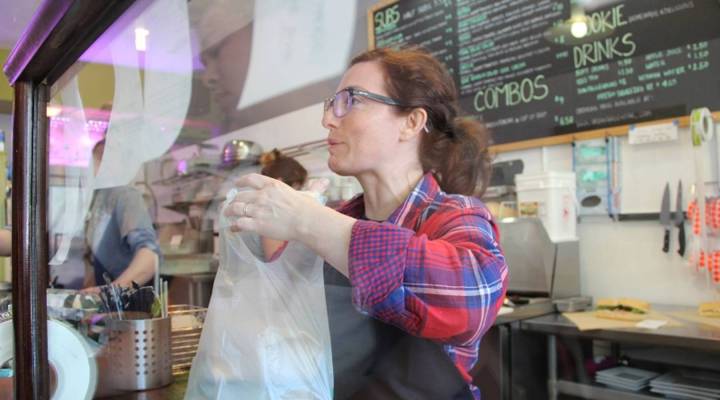
Alaskans faced with the first recession in decades

On a recent sunny afternoon in downtown Anchorage, there’s a late lunchtime rush at the sandwich shop Urban Greens. Behind the counter is a woman in red flannel and big glasses. She seems to know the names of half the people walking through the door.
This is Rachel Mills — until July, she was the manager at Urban Greens. But go back several months, and she had a very different role — as a botanist for ASRC Energy Services, an oil and gas contractor.Then, this winter, right around the time oil plunged to a 12-year low, Mills was told she no longer had a job.
“It was a January sunny day, and I’m just sitting in the kitchen, and I’m thinking, “Wow, so this is what it’s like to fail,’” Mills said.
That same month, the state — one of the few other employers for a botanist — announced a hiring freeze, as the drop in oil revenue prompted budget cuts. “I have all this education,” Mills said. “I did everything by the book. I worked really hard. I got the job. Everyone likes me … and it doesn’t matter.”
While the U.S. has gone through some major recessions since the late 1980s, at least one state chugged along through them all: Alaska.
But now, with the price of oil at half its recent peak, Alaska is in its first recession in nearly three decades. The state has lost more than 2,000 jobs in the energy industry since this time last year.
That means many Alaskans like Mills are adjusting to a new reality: lost paychecks, unexpected career changes — and the possibility they might have to leave the state altogether. Many Alaskans have lost work in the last year, as the state has seen its first real dip in jobs in nearly three decades.
According to state economist Neal Fried, with the exception of a brief slowdown in 2009, when the Great Recession hit tourism, Alaska has seen economic growth every year since 1988. Until now.
“This is an interruption of that,” Fried said. “I think we will define this possibly as a new period. The question is how long of a period.”
A new period defined by low oil prices. The unemployment rate has ticked up slightly, to 6.7 percent. But Fried said a more useful number in Alaska is jobs gained and lost.
Since May, 2015, the state is down about 2,100 jobs in oil and gas — or about 15 percent — and those numbers likely don’t include people like Mills, a botanist. Other fields, like construction, have also shed workers.
Alaska has gained jobs in some areas — like healthcare and retail – but it’s not the same. “Those are hard jobs to replace,” Fried said.
That’s in part because of the pay difference. Oil and gas jobs pay more than two and a half times the average in other industries. Fried said the result might be more people moving out of state.
Brad Campbell doesn’t want to move. He worked as a financial analyst at BP for more than 15 years, until he was laid off in June. “Two years in a row I went through uncertainty,” Campbell said. “Am I going to have a job or not? I’m kind of relieved I don’t now, at least I know.”
Campbell wants to stay in oil and gas. His goal for now is to hang onto his home. “[I’m] a little worried about getting a job that pays well,” he said. “But I’m just going to have faith that it’s going to work out.”
Above all, he’d like to stay in Alaska, where he’s lived since 1983.
As for Rachel Mills, she left her job at Urban Greens. She’s now working in the back office at another local restaurant — and sending out job applications in her field. The current gig, like her last one, came with a major pay cut and no benefits.
But, she said, she feels lucky to have a salary — and it’s better than when she was waiting to be laid off from her job in oil and gas.
“It was agony,” Mills said. “You’re just standing around, knowing there’s nothing to work on. You’re worried about everyone… and who wants to work in this moribund environment, where at any moment, we’re all going to be without jobs?”
There’s a lot happening in the world. Through it all, Marketplace is here for you.
You rely on Marketplace to break down the world’s events and tell you how it affects you in a fact-based, approachable way. We rely on your financial support to keep making that possible.
Your donation today powers the independent journalism that you rely on. For just $5/month, you can help sustain Marketplace so we can keep reporting on the things that matter to you.


















